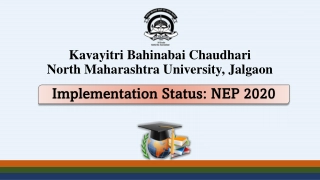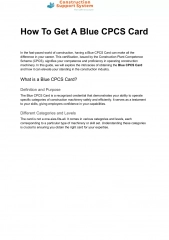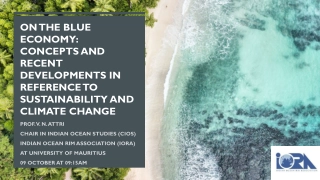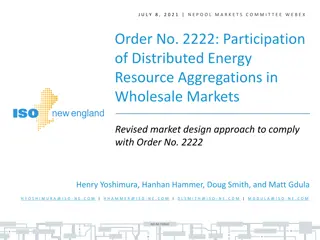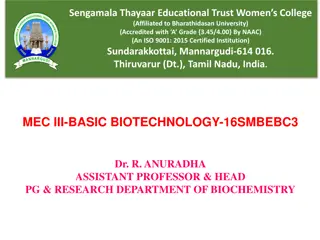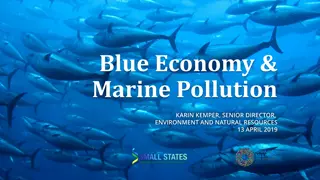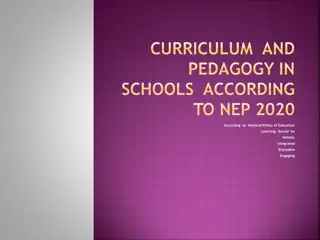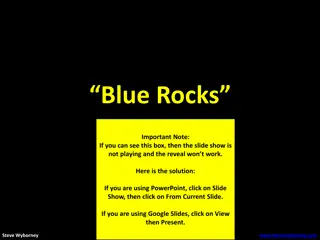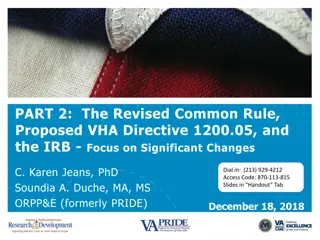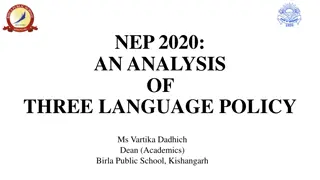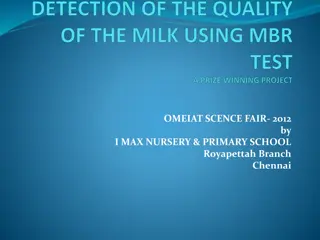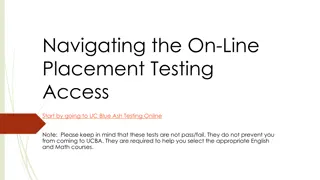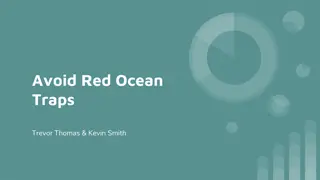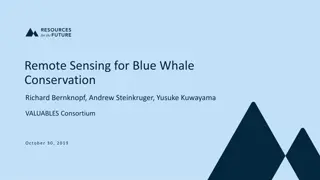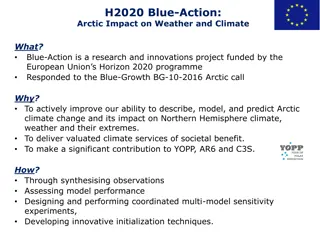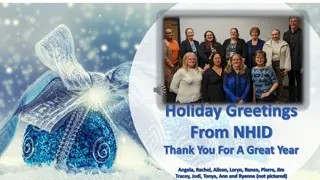
Transformational Reforms in National Education Policy 2020
Explore the major transformational reforms in the education sector brought about by the National Education Policy 2020. These changes include universalization of early childhood care education, a new curriculum structure integrating essential skills, emphasis on holistic student progress tracking, vocational education enhancements, common entrance exams, professional standards for teachers, and comprehensive changes in higher education for 2035 goals.
Download Presentation

Please find below an Image/Link to download the presentation.
The content on the website is provided AS IS for your information and personal use only. It may not be sold, licensed, or shared on other websites without obtaining consent from the author. If you encounter any issues during the download, it is possible that the publisher has removed the file from their server.
You are allowed to download the files provided on this website for personal or commercial use, subject to the condition that they are used lawfully. All files are the property of their respective owners.
The content on the website is provided AS IS for your information and personal use only. It may not be sold, licensed, or shared on other websites without obtaining consent from the author.
E N D
Presentation Transcript
National Education Policy 2020 Major Transformational Reforms in Education Sector 1
NEP 2020 : Consultation Process Online : www.MyGov.in (26.01.2015 31.10.2015) Nearly 2.5 lakhs Gram Panchayats, 6600 Blocks, 6000 ULBs, 676 Districts (May- Oct. 2015) Draft NEP, 2019 Summary in 22 languages/Audio Book Education Dialogue with MPs (AP, Kerala, Telangana, TN, Puducherry, Karnataka & Odisha) Special Meeting of CABE (21.09.2019) Parliamentary Standing Committee on HRD on 07.11.2019 2
Major Changes from NPE 1986: School Education Major Changes from NPE 1986: School Edu Universalization of Early Childhood Care Education (ECCE) National Mission on Foundational Literacy and Numeracy 5+3+3+4 Curricular and Pedagogical Structure Curriculum to integrate 21st Century Skills, Mathematical Thinking and Scientific temper No Rigid Separation between Arts & Sciences, between Curricular and extra-Curricular activities, between Vocational and Academic streams Education of Gifted Children Gender Inclusion Fund KGBVs upto Grade 12 Reduction in Curriculum to Core Concepts Every Child will come out of School adept in at least one skill 3
Major Changes from NPE 1986: School Education New National Curriculum Framework for ECE, School, Teachers and Adult Education Board Examination will be Low Stakes, Based on Knowledge Application Medium of Instruction till at least Grade 5, and preferably till Grade 8 and beyond in Home Language / Mother tongue/ Regional Language 360 degree Holistic Progress Card of Child Tracking Student Progress for Achieving Learning Outcomes Vocational Education to be started from Class 6 with Internships NTA to Conduct Common Entrance Exam for Admission to HEIs National Professional Standards for Teachers (NPST) Book Promotion Policy and Digital Libraries Common Standards for Public & Private Schools 4
Major Changes from NPE 1986: Higher Education 50 % Gross Enrolment Ratio by 2035 Holistic and Multidisciplinary Education -Flexibility of Subjects Multiple Entry / Exit UG Program - 3 or 4 year PG Program 1 or 2 year Integrated 5 year Bachelor s / Master s M Phil to be discontinued Credit Transfer and Academic Bank of Credits HEIs : Research Intensive/Teaching Intensive Universities and Autonomous Degree Granting Colleges Model Multidisciplinary Education and Research University (MERU) (in or near every District) 5
Major Changes from NPE 1986: Higher Education Graded Autonomy : Academic, Administrative & Financial Phasing out Affiliation System in 15 years National Mission on Mentoring Independent Board of Governors (BoG) Light but Tight Regulation by Separation of Functions Single Regulator for Higher Education (excluding Legal and Medical) Common Norms for Public and Private HEIs Private Philanthropic Partnership Fee fixation within Broad Regulatory Framework Public Investment in Education Sector to reach 6% of GDP at the earliest 6
Major Changes from NPE 1986: Higher Education National Research Foundation (NRF) Internationalisation of Education Integration of Vocational, Teacher and Professional Education Setting up of New Quality HEIs has been made Easier Standalone HEIs and Professional Education Institutions will evolve into Multidisciplinary Special Education Zone for Disadvantaged Regions National Institute for Pali, Persian and Prakrit National Educational Technology Forum (NETF) MHRD to be renamed as M/o Education 7
Indian Knowledge Systems, Languages, Culture and Values Focus on Literature & Scientific Vocabulary of Indian Languages Language Faculty Research on Languages Strengthening National Institutes for promotion of Classical Languages & Literature Indian Institute of Translation and Interpretation (IITI) Cultural Awareness of our Indian Knowledge Systems Promoting Traditional Arts / Lok Vidya HEI / School or School Complex to have Artist(s)-in-Residence 8
Use of Technology Use of Technology in Education Planning Teaching, Learning & Assessment Administration & Management Regulation - Self Disclosure & Minimum Human Interface Increasing Access for Disadvantaged Groups Divyang Friendly Education Software e-Content in Regional Languages Virtual Labs National Educational Technology Forum (NETF) Digitally Equipping Schools, Teachers and Students 9
Outcomes of NEP 2020 Universalization from ECEE to Secondary Education by 2030, aligning with SDG4 Attaining Foundational Learning & Numeracy Skills through National Mission by 2025 100% GER in Pre-School to Secondary Level by 2030 Bring Back 2.5 Cr Out of School Children Inclusive & Equitable Education System by 2030 Reduced Curriculum integrating Indian Culture, Values and ethos, ICT & 21st Century Skills Board Exams to test core concepts and application of knowledge Every Child will come out of School adept in at least one Skill Common Standards of Learning in Public & Private Schools 10
Outcomes of NEP 2020 50% GER in Higher Education by 2035 Enhancing Employability : 50% Learners to have exposure to Vocational Education by 2025 All HEIs to be Multidisciplinary and Integrated Teacher Education National Research Foundation (NRF) Better Global Rankings Effective Governance & Separation of Powers 11
Dr K Kasturirangan Committee Members : S.No Name of the Member Dr. K. Kasturirangan (Chairman) Contact No. 9845007998 (Personal) O: 080-23610522 (Direct Line- Dr Kasturirangan) 9821310081(M), +609 2584192 Email 1 krangank@gmail.com 2 3 4 Dr. Vasudha Kamat Dr. Manjul Bhargava Dr. Ram Shankar Kureel 07324-274 377, 9871450315(M) kamatvasudhav@gmail.com bhargava@math.princeton.edu drrskureel@gmail.com 5 Prof. T.V. Kattimani 9599292424(M), 9425331399(M) 07629269710 9415822107(M) tvkattimani@gmail.com vcigntu@gmail.com kmtripathiknp@gmail.com 6 Shri Krishna Mohan Tripathy Dr. Mazhar Asif 7 9435118077(M), 03612672683 mazharassam@gmail.com 8 Dr. M.K. Sridhar 9845222573(M), 8048068027(M) Escort 9900086660 09223344303(M) bharathwaasi@gmail.com 9 Shri Rajendra Pratap Gupta advisor.healthminister@gov.in office.rajendra@gmail.com 12
Thank You 13

